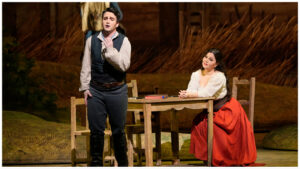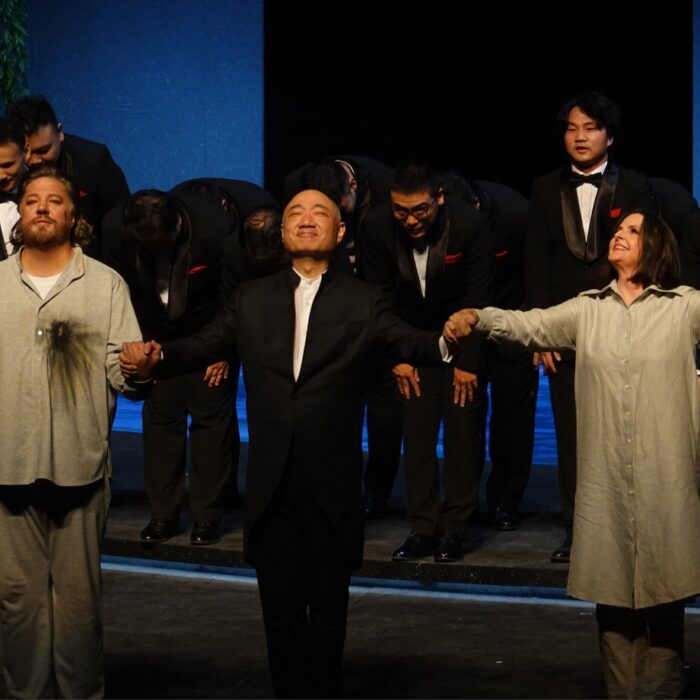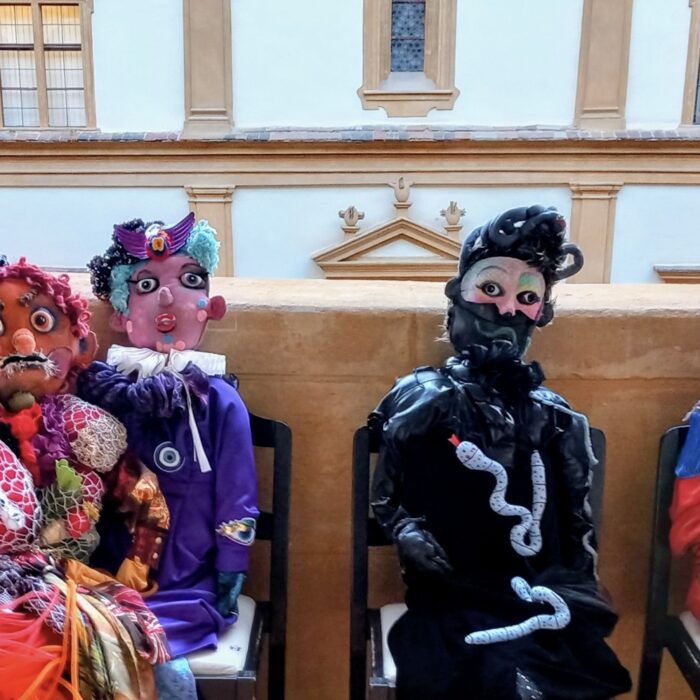
Metropolitan Opera 2022-2023 Review: L’Elisir d’Amore (Cast B)
Xabier Anduaga Makes A Stirring Debut Alongside Aleksandra Kurzak
By Logan MartellOn April 13, 2023, the Metropolitan Opera opened its April run of Donizetti’s “L’Elisir d’Amore.”
Bartlett Sher’s 2012 production was met with new life thanks to a number of stunning debuts from the cast. The staging itself presents a view of Italy during unification which neither rebukes nor flatters the historical context of the work, leaving an authentic, if understated, base upon which the comedy unfolds.
A Star in the Making
Making a sensational Met debut was Spanish tenor Xabier Anduaga as Nemorino. The lovelorn country boy was embodied with youthful vulnerability finely belied by Anduaga’s rich yet sensitive instrument. These qualities made for an endearing rendition of “Quanto e bella, quanto e cara,” capped off with a gorgeous, pianissimo cadenza delivered with casual ease as Anduaga stood with his hands in his pockets and his crestfallen gaze cast downwards. This opening aria was a truly fitting aperitif for what was to follow over the performance.
After making himself scarce while Belcore tried to woo Adina, he emerged from the background to engage with Aleksandra Kurzak for their duet “Chiedi all’aura lusinghiera,” where he took up her melody with sorrow for his own state and great affection towards her. This, and their playful bantering which followed as Nemorino showed himself bold enough to grab her by the skirt, helped show that there were genuine feelings between the two before any dubious love potions became involved.
Beyond the pining, Anduaga also reveled in comedic moments such as when he budged around the crowd for Adina’s story, and when he began his drunken escapades about the town. As the antics of the evening wore to an end, his rendition of “Una furtiva lagrima” struck a delectable balance between love and bewilderment as Anduaga was led by these feelings about the stage. In the past I have seen tenors prepare the passages leading up to the final pianissimo with remarkable sweetness and to splendid effect; here Anduaga’s voice was tinged by Nemorino’s conflict in ways that highlighted the multitude of emotions that ensued, and it was the way his firm tenor broke so beautifully into the second repetition of “si puo morir…” that captured both the strength and the vulnerability of love as he achingly closed the phrase. The showstopping applause Anduaga received was a splendid toast to this tenor’s debut on the Metropolitan Opera stage.
As Adina, Aleksandra Kurzak brought not only bubbly vivacity, but a confident allure that frequently delighted. Her early aria “Della crudele Isotta” was illuminated with great passion and interest as she seemed to live within the story she read to the crowd. With Belcore, she displayed a demurring yet flirtatious nature which managed to draw in the soldier before her skill with a whip kept their advances at bay. Her duet with Nemorino moments later rang with a consolatory beauty, with phrases such as “she will tell you that it’s her nature to be free…” capped off with a gorgeous, almost teasing, cadenza before he offered his own rebuttal. Her confusion at Nemorino’s newfound perspective gave Kurzak the chance to engage in indignant, even scorned tones, before she began to play his game.
As the hijinks of the second act carried onwards, her later duet with Dulcamara, “Una tenera occhiatina,” gave her a chance to match spells with the doctor, her later aria “Prendi per me si libero” was a sensual and sonorous vehicle of soprano charm that grew in delivery from a honeyed lyricism to a soaring and resolute roulade as Adina readied to seal the deal on the now-eligible bachelor.
All’s Fair in Love and War
In the role of Sargent Belcore, baritone Joshua Hopkins was a source of fun antagonism. In voice and physicality, he brought sufficient menace and exuded pomp without becoming a peacock. Heralded by a gunshot and approaching soldiers, his rendition of “Come Paride vezzoso” swaggered with cocky ornaments and was met with laughter and applause. His earnest demeanor and blustering resonance did much to sell humorous lines such as “I invade in war and love,” as he arrived in time to turn the tide in Adina’s favor for the Act one finale. These numbers gave ample time to enjoy the three artists play off one another with great energy and execution.
His Act two duet with Nemorino, “venti scudi,” made for a nice moment of sparring between Hopkins and Anduaga amidst the engagement festivities as both men seemed to think they were getting the upper hand on the other. Through the night, Hopkins brought the most out of this buffo role with arresting charm.
While a smaller role, soprano Magdalenza Kuzma beamed during her debut as the gossip-loving Giannetta. Her spirited tones added nicely to the choral texture for the opening number “Bel conforto al mietitore,” and came into the forefront for the Act two “Saria possibile,” where she, much like Dulcamara, spun the women into a frenzy over the newly-wealthy Nemorino.
In the role of Doctor Dulcamara, bass Alex Esposito’s sense of humor and guile made for a magnetic debut and much laughter. His aria “udite udite oh! Rustici,” was delivered with fluidity and soon had the crowd, and audience under his spell. When interacting with Nemorino, it was fun to watch his reputable air vanish the instant he was out of the latter’s sight as he readied to skip town as soon as possible. This crowd-pleasing quality returned for his barcarolle with Adina “La Nina gondolier e il senator,” where Esposito deftly slipped in and out of the guise of an elderly man.
As an observer of the events, Esposito’s phrases often lent a humorous undercurrent to the romantic chaos, and it’s through his role as an instigator that the standard operatic love triangle is made into something resembling magic. Through his time onstage Esposito demonstrated artistry, as well as charisma, in such a way that one could easily forget this was the first time he’s done so in this opera house.
The debuts of the evening were not just limited to the stage, as conductor Michele Gamba also bore his talents at the head of the orchestra. From the alternating ardor and whimsy of the prelude to the captivating choral and ensemble numbers, Gamba led with an attention to all the subtle nuances of emotion and circumstance.
Thursday’s performance had all the ingredients needed for a heady tonic of musical comedy, thanks to the respective talents of the cast. Despite the undoubted triumph of the artists, it was hard to not notice the many vacant seats from where I sat in the orchestra section. While by no means a new work or production, the trill shared by the audience was proof enough that when artistry is at the forefront, even the most vintage and familiar of operas can be set alight with new life.



